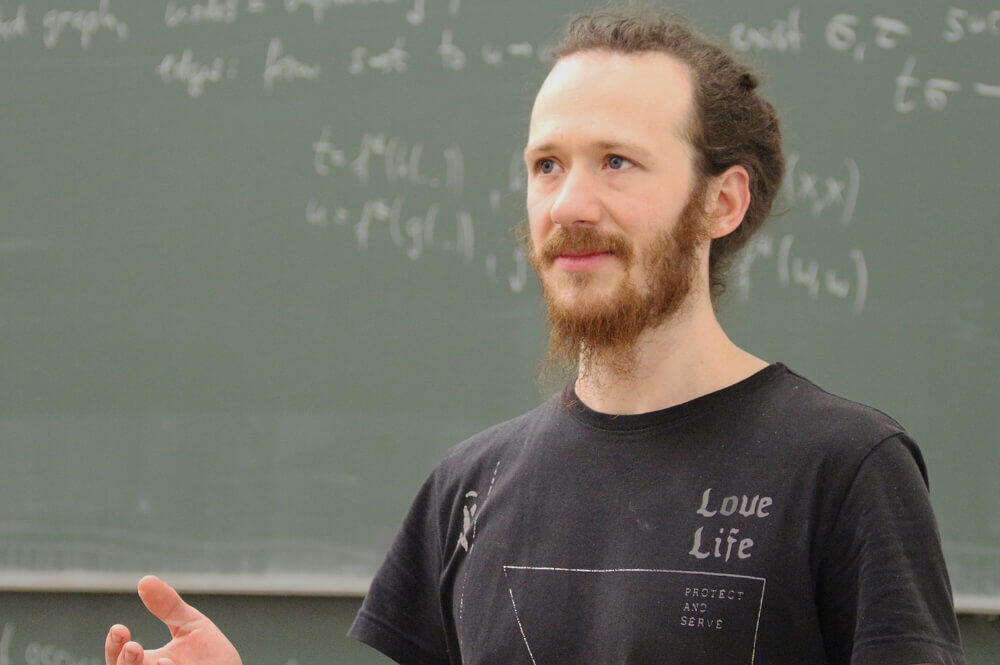Computer scientist makes virtual worlds graspable

Computer Scientist Dr. Paul Strohmeier © Universität des Saarlandes
A walk in the woods: one can feel soft moss under one’s feet, notice twigs and branches breaking when stepped upon, feel the gnarled bark of a tree. Sensations such as these are perceived through the sense of touch and have thus so far been denied to digital worlds. Paul Strohmeier, a computer scientist at Saarland University, has now developed a new method to artificially generate such haptic sensations. This makes virtual and augmented reality graspable in the truest sense of the word. For his dissertation on this topic, Paul Strohmeier has now been honored with an award by the world’s largest conference for human-computer interaction.
With his new method, the Saarbrücken-based computer scientist Paul Strohmeier creates authentic haptic sensory experiences. He achieves this by adjusting the frequency and intensity of vibration impulses in the millisecond range precisely to the movements of a person. The impulses are then no longer perceived as vibration, but rather as a property of the material one is currently touching. “This can be used to create material experiences, for example friction or certain surface structures,” says Strohmeier. Experiences which are usually related to movement, such as weight or resistance, can also be perceived via the fingertips and thus be artificially generated through the new method.
Together with students of Saarland University, Strohmeier is working on shoes in which his technology is incorporated. Among other things, they could be used in virtual reality (VR). Up to now, VR has primarily exposed people to visual stimuli and auditory impressions. “With the shoes, it will also be possible to address the sense of touch or the sensation of movement. If you walked along a virtual gravel path, for example, you could feel the rocky surface under your feet. This makes it easier to immerse oneself in virtual worlds”, says Strohmeier. The possible applications go even further, for example in augmented reality: even things that were previously beyond the horizon of human perception could be made perceptible as a haptic sensory impression. If the technology were to be coupled to sensors, the user could, for instance, experience resistance when approaching a toxic but odorless gas.
Strohmeier carried out the basic research for his new development with his doctoral thesis entitled “Shaping Material Experiences: Designing Vibrotactile Feedback for Active Perception”. His thesis was recently awarded the “Outstanding Dissertation Award” of the “Special Interest Group on Computer Human Interaction (SIGCHI)”. The prize is considered one of the most prestigious awards for doctoral theses in this field of research and is presented at the largest HCI conference in the world, the “ACM Conference on Human Factors in Computing Systems (CHI)”, which had to be cancelled this year due to the corona crisis. According to the jury’s verdict, the submitted work could improve how haptic stimuli will be used in the field of human-computer interaction. Strohmeier wrote his dissertation at the University of Copenhagen in Denmark.
Since July 2019, Strohmeier has been a postdoctoral researcher in Prof. Jürgen Steimle’s research group on human-computer interaction at the Saarland Informatics Campus. The international reputation of the group and the research environment at Saarland University were the reasons for moving from Copenhagen to Saarbrücken. “I particularly like the fact that the cooperation of different disciplines and institutes is so easy here. Whether material sciences, psychology of perception or world-leading computer science institutes – everything is in close proximity to each other,” says the computer scientist about his new research home.
Questiones can be directed at:
Dr. Paul Strohmeier
strohmeier@cs.uni-saarland.de
More Information:
https://hci.cs.uni-saarland.de/
https://chi2020.acm.org/
Background Saarland Informatics Campus:
800 scientists and about 2000 students from 81 nations make the Saarland Informatics Campus (SIC) one of the leading locations for computer science in Germany and Europe. Five world-renowned research institutes, namely the German Research Center for Artificial Intelligence (DFKI), the Max Planck Institute for Computer Science, the Max Planck Institute for Software Systems, the Center for Bioinformatics and the Cluster for “Multimodal Computing and Interaction” as well as Saarland University with three departments and 18 degree programs cover the entire spectrum of computer science.
Editor:
Philipp Zapf-Schramm
Competence Center Computer Science
Saarland Informatics Campus
Phone: +49 681 302-70741
E-Mail: pzapf@mmci.uni-saarland.de
Die Öffentlichkeitsarbeit am Saarland Informatics Campus wird unterstützt durch das Kompetenzzentrum Informatik Saarland, gefördert aus Mitteln des Europäischen Fonds für regionale Entwicklung (EFRE) und Mitteln der Staatskanzlei Saarland.


